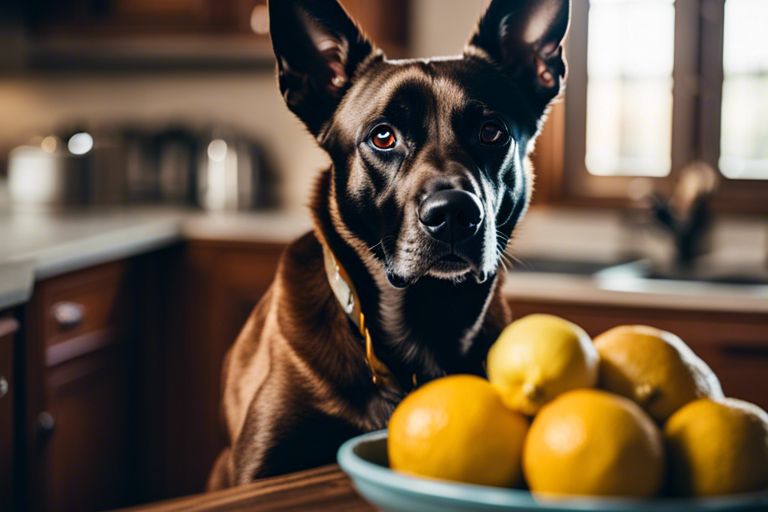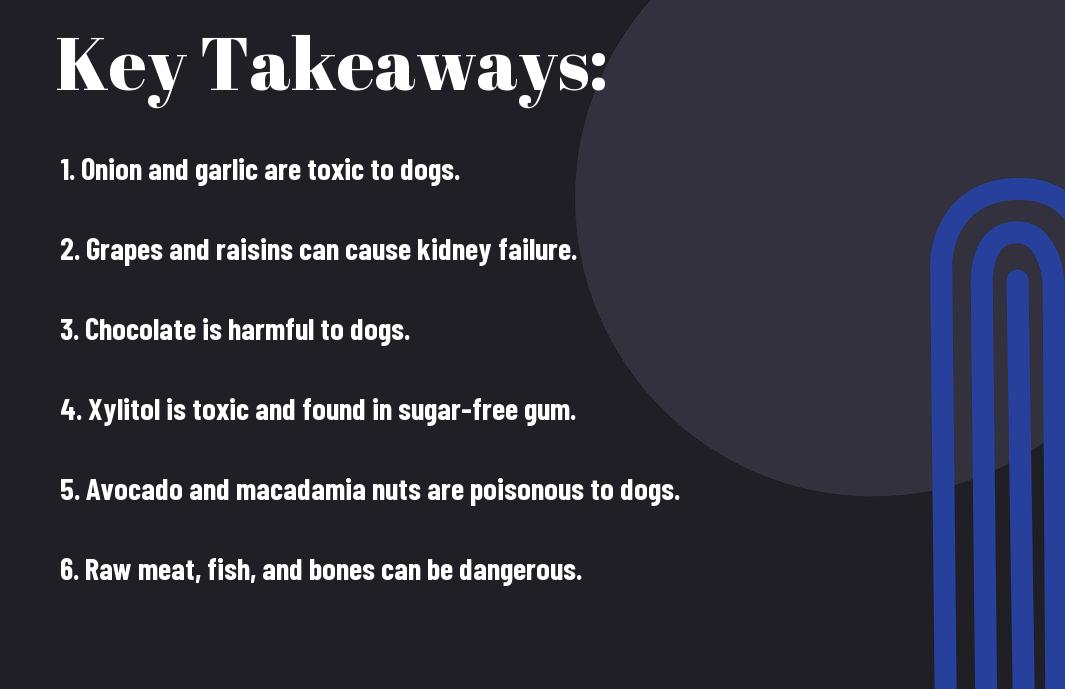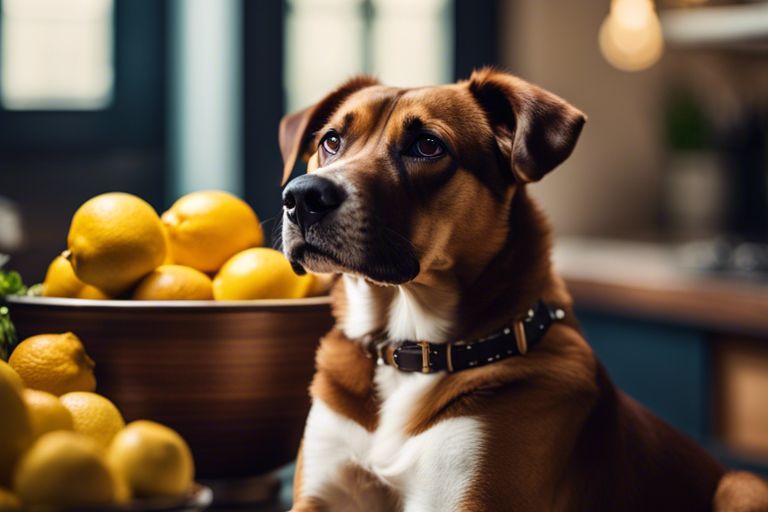It’s a known fact that dogs can be picky eaters. While they may have an impressive appetite, there are certain foods that can make your canine companion turn up their nose with disdain. In this blog post, we will explore some of the common foods that dogs typically detest, helping you avoid any dinner table disappointments with your four-legged friend.
Key Takeaways:
- Spicy Foods: Dogs have sensitive taste buds and typically dislike spicy foods that can cause discomfort or irritation.
- Citrus Fruits: The strong scent and taste of citrus fruits like lemons and limes are often unappealing to dogs.
- Dairy Products: Many dogs are lactose intolerant and may experience digestive issues or discomfort after consuming dairy products.
The Bitter Truth
A
Dogs and their sensitive taste buds
The truth is, your furry friend might not always enjoy the flavors you assume they do. Dogs have incredibly sensitive taste buds compared to humans, making them more susceptible to bitter tastes that they often find unpleasant. This sensitivity is a result of their evolutionary history as scavengers, where bitterness could indicate toxicity in certain foods.
The science behind canine taste preferences
Bitter taste receptors in dogs are more numerous and sensitive than in humans, explaining why they tend to steer clear of bitter foods. These receptors are designed to alert dogs to potential dangers in their environment, helping them avoid consuming anything harmful. So, when your pooch turns up their nose at certain foods, it may be their way of protecting themselves from potentially dangerous substances.
Bitter truth: Understanding your dog’s aversion to bitter flavors can help you make better choices when it comes to their diet. By respecting their sensitive taste buds, you can ensure that your furry companion stays healthy and happy.
The Top Offenders
Now, let’s talk about some of the top offenders when it comes to foods that dogs absolutely hate. These items are not only unappetizing to your furry friend but can also be harmful to their health.
Onions and garlic: the toxic twosome
Any dish containing onions or garlic should be kept far away from your dog. These ingredients are toxic to dogs and can cause damage to their red blood cells, leading to symptoms like weakness, vomiting, and breathing difficulties. Make sure to double-check all your ingredients before sharing any food with your pet to avoid any potential risks.
Chocolate: the sweet deceit
With its sweet aroma and tempting taste, chocolate may seem like a delightful treat to share with your dog. However, it is actually one of the most dangerous foods for them. Chocolate contains theobromine and caffeine, which can lead to symptoms such as increased heart rate, tremors, and in severe cases, seizures and even death.
Twosome
Grapes and raisins: the forbidden fruit
Grapes and raisins are another duo that should never make its way into your dog’s food bowl. Even in small amounts, these fruits can cause kidney failure in dogs. Symptoms may include vomiting, diarrhea, and lethargy. It’s best to play it safe and keep all grape and raisin products out of your dog’s reach to prevent any unwanted trips to the vet.
Twosome
Chocolate and similar sweets should be kept well out of reach of your furry friend. While you may find them irresistible, they pose a significant threat to your dog’s health and should never be shared. If you suspect that your dog has ingested any of these toxic foods, contact your veterinarian immediately for guidance on the next steps to ensure your pet’s well-being.
The Uninvited Guests
Not all foods are safe for dogs to eat, and some can even be harmful to their health. Here are some common uninvited guests that you should keep away from your furry friends.
Macadamia nuts: the crunchy culprit
With their rich and buttery flavor, macadamia nuts may be a favorite snack for you, but they are a big no-no for your dog. These nuts can cause weakness, vomiting, tremors, and hyperthermia in dogs. It’s best to keep these crunchy culprits out of reach to prevent any accidents.
Avocado: the creamy conundrum
With its creamy texture and delicious taste, avocado may seem like a healthy treat for your pup. However, the fruit contains persin, a substance that can be toxic to dogs and cause stomach upset, breathing difficulties, and even fluid accumulation in the chest. It’s best to avoid sharing your avocado toast with your furry friend.
To keep your dog safe, make sure to avoid feeding them any foods that contain avocado, such as guacamole or avocado-based dressings.
Raw or undercooked meat: the bacterial bogeyman
To dogs, raw or undercooked meat may seem like a delicious treat, but it can actually be quite dangerous. Raw meat can contain harmful bacteria like E. coli and Salmonella, which can lead to food poisoning and gastrointestinal issues in dogs. It’s important to always cook meat thoroughly before feeding it to your furry friend to prevent any health problems.
It’s best to stick to high-quality dog food that is specifically formulated to meet your pet’s nutritional needs and avoid the risk of foodborne illnesses from raw or undercooked meat.
The Fishy Business
Your What tastes do Dogs hate the taste of? instincts as a dog owner tell you to share your delicious meals with your furry friend. However, some foods are just not meant for your pup, and fish happens to be one of them. Let’s probe why your dog turns up their nose at the fishy offerings you might be tempted to share.
Raw fish: the slimy suspect
An important reason dogs dislike fish is due to the texture. Raw fish can be slimy and slippery, which can be unappealing to your dog’s taste buds. Also, raw fish poses risks of bacterial and parasite contamination, which could harm your dog’s digestive system. Therefore, it’s best to avoid feeding your dog raw fish to keep them healthy and happy.
Bones: the crunchy danger
An important thing to keep in mind is that bones, especially fish bones, can be hazardous for your pup. Fish bones are small and brittle, making them a choking hazard. They can also splinter and cause internal injuries to your dog if ingested. So, steer clear of feeding your dog any fish with bones to prevent any potential harm.
Fishy foods can cause issues for dogs beyond just the bones; they can also harbor parasites or bacteria that could be harmful to your pet. It’s always safer to stick to dog-friendly treats to keep your furry friend healthy and content.
Shellfish: the allergenic adversary
Shellfish, like shrimp or crab, can be allergenic to some dogs. Just like with humans, dogs can develop allergies to certain foods, and shellfish are a common trigger. Allergic reactions in dogs can manifest as skin rashes, itching, digestive issues, or even more severe symptoms. To prevent any allergic reactions and keep your dog comfortable, it’s best to avoid sharing shellfish with them.
Shellfish, due to their potential allergenic properties, should be avoided when considering treats for your dog. Keep an eye out for any signs of allergies in your pet and consult your veterinarian if you suspect any adverse reactions to shellfish.
The Dairy Dilemma
All dogs have different tastes, but there are certain foods that most canines tend to steer clear of. As far as dairy products, many dogs have a love-hate relationship with them.
Lactose intolerance: the canine curse
Dilemma: Dogs, like some humans, can be lactose intolerant, meaning they have difficulty digesting lactose, the sugar found in dairy products. This can lead to digestive issues such as bloating, gas, and diarrhea when your furry friend consumes milk or other dairy items.
Milk and dairy products: the unwanted guests
An abundance of dairy products in your dog’s diet is generally not recommended. Cheese, for example, can be high in fat and salt, leading to obesity and other health problems in dogs. Additionally, some dogs may be allergic to certain proteins found in dairy, causing skin irritations and itching.
A good rule of thumb is to avoid feeding your dog large amounts of dairy products and to monitor their reactions when they do consume them. If you notice any signs of discomfort or unusual behavior after your dog eats dairy, it’s best to consult with your veterinarian for further guidance.
The Pantry Perils
Once again, your pantry holds hidden dangers for your canine companion. Be aware of these common pantry items that can be harmful to your furry friend.
Caffeine: the jittery jeremy
Pantry shelves often hold coffee grounds, tea bags, and energy drinks which can be potentially harmful to your dog due to their caffeine content. Caffeine can cause restlessness, rapid heartbeat, muscle tremors, and even seizures in dogs. Make sure to keep these items out of reach from your curious pup.
Xylitol: the sugar substitute saboteur
Perils lurk in the form of xylitol, a sugar substitute found in many sugar-free gum, candies, baked goods, and even some peanut butter brands. Xylitol can cause a rapid release of insulin in your dog, leading to a dangerous drop in blood sugar levels. Ingesting xylitol can result in symptoms like vomiting, lethargy, and in severe cases, liver failure. Always check the labels of products before sharing any human treats with your pet.
The use of xylitol in human food products is widespread, making it crucial to read ingredient labels carefully to protect your furry friend from accidental ingestion.
High-sodium foods: the salty snares
High-sodium foods like salty snacks, processed meats, and certain canned goods can pose health risks to your dog. Consuming high amounts of sodium can lead to electrolyte imbalances and dehydration in dogs. Symptoms of sodium poisoning include increased thirst, vomiting, diarrhea, and in severe cases, tremors and seizures. Avoid sharing your salty treats with your four-legged friend to keep them safe and healthy.
Sodium is commonly found in processed foods, so it’s necessary to be cautious about what you offer your dog to snack on. Stick to dog-friendly treats and avoid sharing your sodium-rich snacks with your pet.
Final Words
With these considerations in mind, you now have a better understanding of the foods that dogs generally dislike. Remember that every dog is different, so it’s always a good idea to observe your pet’s reactions to certain foods and make adjustments accordingly. By avoiding foods that are harmful or unappealing to dogs, you can ensure that your furry companion stays healthy and happy.
FAQ
Q: What are some foods that dogs hate?
A: Dogs generally dislike spicy foods, citrus fruits, dairy products, onions, garlic, and foods with artificial sweeteners.
Q: Why do dogs dislike spicy foods?
A: Dogs have taste buds that are more sensitive to spiciness compared to humans, making them averse to spicy flavors.
Q: Can dogs eat citrus fruits?
A: Citrus fruits like lemons and oranges are not recommended for dogs as they can cause stomach upset and be toxic to them.
Q: Why should dogs avoid onions and garlic?
A: Onions and garlic contain compounds that can be harmful to dogs, leading to conditions like anemia and gastrointestinal issues.
Q: Is it safe for dogs to consume dairy products?
A: While some dogs can tolerate small amounts of plain yogurt or cheese, many dogs are lactose intolerant and can experience digestive issues if they consume dairy products.




